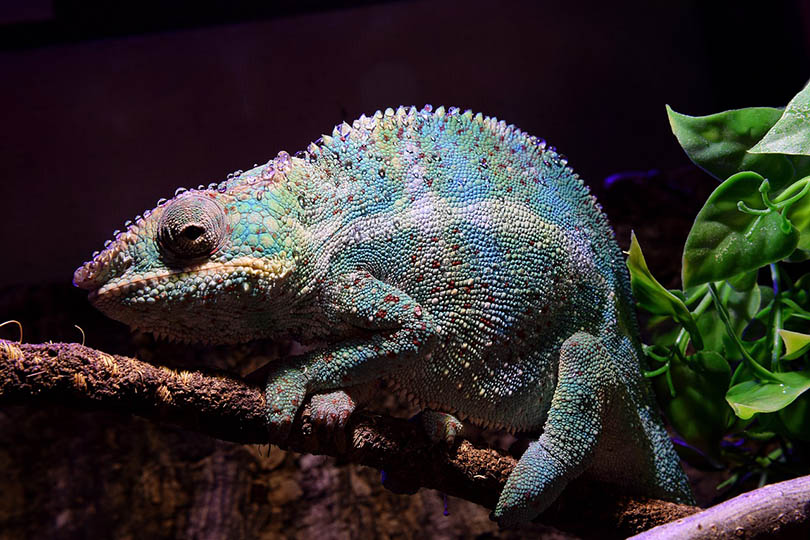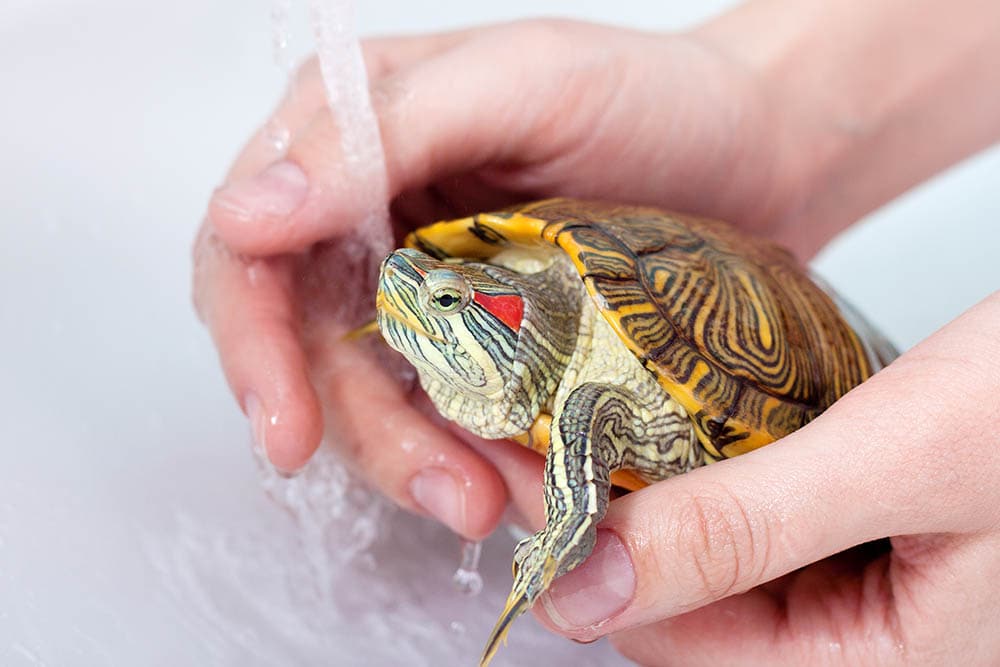
When you consider bringing a pet into your life, several factors must be considered. You must devote time, finances, and energy to any pet. Medical care and expenses are also something to think about before getting a companion. For instance, which health conditions are your pet susceptible to?
If you are thinking about bringing an iguana home, there are some medical complications that you will want to watch out for. To learn about the common diseases your iguana may face, keep scrolling to read more below.
The 11 Common Diseases in Iguanas
1. Metabolic Bone Disease
Several disorders relate to the degeneration or dysfunction of your iguana’s bones or related systems. These disorders tend to be classified under an umbrella term known as metabolic bone disease.
Metabolic bone disease is caused by an improper amount of vitamin D3, phosphorous, and calcium. This imbalance can be caused by either a deficiency of these elements or by an overabundance of them.
Signs that your iguana has developed metabolic bone disease include hard knobs along the long leg bones, lumps on the back and the tail, softening or swelling of the lower jaw, and tenderness of the carapace. You may also notice that your iguana walks in jerky motions and shakes when held.

2. Bladder Stones
Bladder stones, also known as urolithiasis or cystic calculi, are common in iguanas. Symptoms can be difficult to identify, as your iguana may appear entirely normal despite developing a bladder stone. Lethargy and a decreased appetite may be the only signs you can spot. In many pets, bladder stones can be treated with specialized medical diets. However, in iguanas, bladder stones are typically treated with surgery. Your iguana may need to be kept at the hospital to recover from the surgery.
3. Avascular Necrosis
Your iguana’s tail or toes are most likely to experience avascular necrosis, although any body part can develop this condition. Avascular necrosis occurs when the blood vessels that supply blood to the area become obstructed.
The obstruction can be caused by several things. A tumor, a blood clot, or a traumatic injury can all prevent blood from flowing.
An obstruction in the blood vessels may lead to infection and swelling. Likewise, with insufficient blood, the surrounding tissue slowly begins to die. This tissue death, or necrosis, can spread to other areas of the body if not treated properly. Treatment often involves removing dead, unshed skin. In more severe instances, amputation may be required.
4. Burns
Thermal burns are common among reptiles in general. These burns are often caused by hot rocks, spotlights, or hotbeds used inside your iguana’s cage. Burns may develop if the heat sources are too hot or too close to your iguana.
If your iguana is suffering from burns, you may notice blisters or lesions on its skin. Since burns can injure the skin, they can also lead to severe infections from dangerous bacteria or fungi. Your iguana may also suffer dehydration.
In severe instances, burns can even cause death. So, don’t delay in getting veterinary treatment for your iguana if you notice burns on its body.
5. Mouth Rot
Most reptiles can suffer from a condition known as mouth rot. This occurs when your iguana’s mouth becomes inflamed. This inflammation can be caused by several things, most often by a compromised immune system. An iguana’s immune system can be weakened from inadequate humidity levels inside the enclosure, oral trauma, or a bad diet.
With a weak immune system, your iguana’s mouth may become overrun by bacteria that it can no longer fight off. Signs of this condition include a decreased appetite, dead tissue in the mouth, reddened and inflamed mouth tissue, and pus coming from the mouth and nose.
If your iguana has mouth rot, your vet may prescribe antibiotics. A thorough mouth rinsing may be necessary as well. In more severe cases, surgical removal of dead tissues may be required. During recovery, fluid therapy and feeding support may be necessary.
6. Constipation
Constipation is a serious issue that your iguana may face. Digestion in iguanas typically takes 3–4 days, but if your iguana eats every day, it should be defecating every day. If your iguana has not defecated recently, there is a chance that it is constipated.
Iguanas suffering from constipation should be taken to the vet immediately. If the intestinal blockage continues for too long, your iguana may begin to experience organ failure.
Constipation can be caused by a parasitic infestation, ingestion of a foreign object, or something else.
7. Infections
Iguanas commonly experience infections. Infections may be minor and easy to treat, but they can also be indicative of something much more serious. Some infections may even become lethal, so it is important to provide a clean environment and schedule regular appointments with a veterinarian to prevent infections from occurring.
Iguanas can develop infections due to the poor quality of their habitat or their food. Likewise, injuries may lead to an infection. Infected iguanas tend to have decreased appetites and suffer from lethargy. There may be skin discoloration or swelling, especially around the mouth and limbs.
8. Egg Binding or Dystocia
Egg Binding, also known as dystocia, is an abnormal birthing process. This means that your iguana cannot pass her eggs. This is often related to a poor environment, such as inadequate UV lighting, improper temperature or humidity, bad nesting, or a poor diet. Age, physical condition, and previous injuries may also play a role.
In such a case, you will need veterinary care for your iguana. Surgery may be required to help the birthing process, although this treatment does not come without potential risks. The health of the young and the potential for future reproduction may be at risk during this procedure.

9. Mites
Mites are parasites that can cause several issues for your iguana. These issues can be itchiness, agitation, and a lack of appetite. It may also have difficulty shedding and have damaged scales. If you notice any of these symptoms in your iguana, carefully check over its body for mites.
Mites tend to be difficult to see. They may require a magnifying glass to see properly, but if you look closely, you may be able to spot them with your naked eye. To eradicate mites, you need to bathe your iguana, clean its enclosure, and invest in mite-repellent products. If you cannot get rid of the mites, speak to your vet to devise a treatment plan.
In severe instances, mite infestations can be life-threatening. That is why it is vital to spot the signs early and reach out to your vet if you cannot get rid of the mites on your own.
10. Fractured Bones
Your iguana may experience a fracture during his lifetime, no matter how well he is cared for. Fractured bones may occur in any part of the body, such as the legs, tail, pelvis, spine, or neck.
Surgery will be needed to fix the broken bone. In some instances, if the infection has had time to settle in, your iguana’s limb may need to be amputated.
Fractures are often directly caused by an injury; however, there may be underlying health issues that have weakened the bone. In these instances, the cause behind bone deterioration will need to be identified and treated to help your iguana recover.
11. Abscesses
Abscesses may occur after an injury or due to a systemic infection. You may notice significant swelling at the site of the abscess, or it may be burrowed beneath the skin.
Contact your vet if you notice an abscess on your iguana’s skin. It will need to be opened and drained and then will need to be flushed periodically for the following days or weeks during recovery.
Final Thoughts
Being a pet owner is all about being prepared, and the best way to be prepared is by knowing the signs of disease and medical complications that your pet may be prone to. The health conditions that iguanas most often suffer from are commonly caused by a poor diet or an unhealthy environment, so talk to your vet to ensure that you provide your iguana with the proper care it needs.
Featured Image Credit: Fill1970, Pixabay








